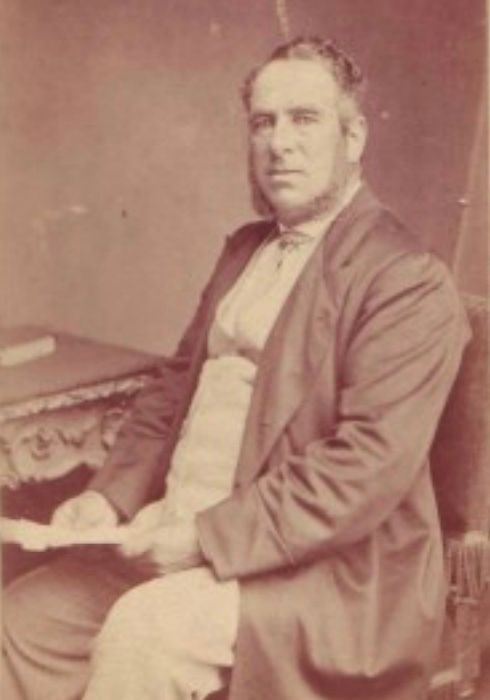A 291 Nogent, 23 January 1945
from Yvonne Bagland
[Letter was received 10th February (noted on the letter)]
My dear Nancy
I received your letter of 29th November on 18th January and I was so thrilled to feel a well stuffed envelope in my hands and to have five pages to read, giving me all the longawaited details of your life during these long years of separation. Many, many congratulations to your grandmother for being so robust and of sound mind at her great age. Old age is a wonderful time of life, when things are like that. We compliment you also, my dear Nancy, for being such a good nurse to your father, which was no easy thing. I know, more than most, how wearisome and tiring this can sometimes be. Your life is one of long devotion. It would have pleased me no end, if you had found a good husband. That is what I hoped for you in the past but, true enough, many men have disappeared – it’s exactly the same in France, with all the prisoners-ofwar and all the men working in Germany. The bomb dropped very close to your home!! For us, the nearest were in rue St Lazare and on the little bridge over the railway line to Courtalain…and the rest were aimed at the railway station. We were bombed about twenty times and we were frightened and went down to the cellar, where there was a vaulted ceiling. Once I even went down to Mrs Holman’s house, one Thursday with the children, when there was an air-raid alert. I knew you would do something for your country and I thought you had re-joined the Red Cross. All I do is go every Monday evening to the local Red Cross to make up parcels for sending to prisoners-of-war. I was happy to the best of my ability, to be able to do something by way of thanks for having the, sadly, rare happiness of having my husband close by us. He was in the East (of France) in 1940, but he managed to get to the south of France – what a sadness it was for us then to see our unfortunate country of France in such a state and to experience the coming of the Germans. It was then that I was more frightened than ever in my whole life. The first time was at the farm dairy in Evron, going for milk – I happened to be face to face with five Germans who wanted to come out. I felt frightened to death, but didn’t want to show it, so I waited outside the doorway for them to come out, when the farmer came and closed the door behind them. Imagine my absolute amazement when they walked towards me, saluted me smartly with a click of their heels and asked me for a little milk in the most correct French. I thought I would faint on the spot at such an unexpected greeting. I then went home and told them I was OK and that they had not gobbled me up. Because we were told that they cut off boys’ hands, I kept the boys in the house, but after a few days, when we noticed there was nothing out of the ordinary, we went on with our everyday lives, not without some nervousness in our beds at night, caused by the sound of their boots in lit doorways, or `at the sound of gunfire. Then, in July, I went back to Nogent, after six weeks without any news of Maurice, who came back home in September 1940. On several occasions, we have had Germans lodging on the top floors. An officer, whose aide-de camp had just washed his hands in the kitchen and who then clicked his heels, well we thought that we should not laugh outright in front of him. And a private, who cried when he saw the little boys in the garden (Ah! He was no member of the SS). That lot can’t have children and they must have no heart either. Finally we had six at one go with six bicycles – I persuaded them to carry their bicycles on their shoulders, when they came through the corridor. I was very pleased about that, I can tell you. Because from then on, we weren’t very scared at all and, since September 1940, I had never uttered a word to any of them. They did not pester women either, they understood our manner towards them, but unfortunately they had no shortage of women! Some of them have had their heads shaved – Marie-Louise Bourgery, Rolande Biet, Mrs Viac, whose husband was shot, and many others. They were in prison here for a long time and now they are in internment camps. And Liberation came and we can all breathe freely now, because the patrol marching in their hobnail boots used to depress us, and how many other countries were there that have had to endure their ferocity. I’ll admit that I was very fearful about the way that they might withdraw, but thanks be to God, everything happened in a good and orderly fashion, and, anyway, there were no SS here. You have heard what they did in Oradour-sur-Glane – they put the whole village in the church and burnt then all alive. I think that they’re in the process of being dealt some kind of just retribution. The Russian advance must be terrifying them, because they are being terrible to their Russian prisoners.* Here as well the short supplies of food and goods has been hard, but we have never been without potatoes, even though they were hard to come by in the end, but we haven’t been too deprived, nothing like the big towns and cities, and it’s still going on there. In our case, we have a little wood, we burn that as little as we can, but here agin we consider ourselves fortunate, compared with people in Paris who have no heating at all. Just a tiny supply of gas since June 1944. Dr F…is still the same as ever. He has been doing his rounds on foot for three weeks, the snow and ice means he can’t take his bicycle, because there’s little or no petrol, of course. It’s kept him young. Suzanne Coudray has been bombed out, I don’t think she lost any furniture, actually, but the house is in an indescribable state, good for nothing more than complete demolition and the distillery was also very damaged. I have no news of Estelle, I haven’t heard anything about the message for Jeannine (sic). Abbé Thibault came back in 1940 and since then he has been a teacher in the seminary, then the head of the Red Cross in the Nogent emergency team and an almoner at the prison. Also, he never stops working, either, and his life is one of total devotion and service. He is still a regular visitor at home and he’s a really good friend to me, and often a great support. We often talk about you. It seems that one day he passed you in the street in Le Mans without seeing you and he is very sorry about that. He asks me to send you his good wishes. I hope that your cold has gone. I have had one as well for weeks now and this cold spell doesn’t help at all. Fortunately I have my boots, because we don’t have shoes any more, I am devastated about that for my Christian. Did I tell you that Mummy had three bouts of pneumonia in 128 months? Now she is over them and she sends her best wishes. We had a wonderful, young American lodger from August to September. Unfortunately, he’s gone now, and it’s a pity, because, as he didn’t speak a word of French, I was forced to do my best in English and, if he had stayed, I would have made real progress. A very ‘nice’ boy, he was. Well, I’ll stop now, my dear Nancy, by sending you our most affectionate greetings and love to your parents.
Yvone (sic)
Haven’t you got a photo of you I could have. I am writing to Herbert Darty (an American ‘soldier’) in English. I would really need you to make corrections…he must laugh at my terrible mistakes…but who cares. [* just to the N-W of Limoges, on 10th June 1944 the 22nd SS-Panzer division murdered the whole population – 642 people, most of them as described in the letter. Therefore, an accurate piece of anti-Nazi propaganda and not a garbled one]






